#i mean let’s be real hyperfixating on sensitive ears is just…
Text
I come bearing a basic humble Halflings Have Really Physically Sensitive Ears piece for you…
Also i feel like “you got oil in that trap?” is the Senshi version of “you got games on your phone?”
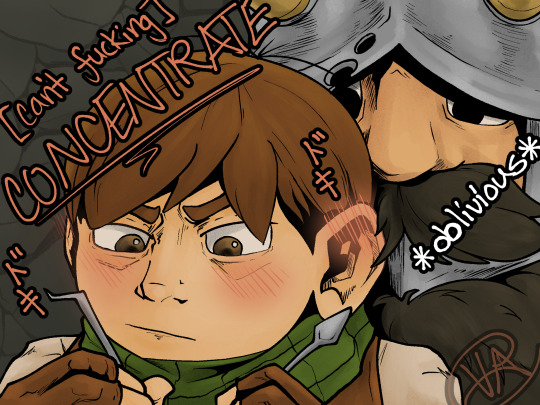
ID in Alt
#chilshi#dungeon meshi#i mean let’s be real hyperfixating on sensitive ears is just…#[stares at username]#pretty fucking on brand for me
288 notes
·
View notes
Note
What is your neurodivergent ‘superpower’?
What are your special interests? Talk about them.
For both John/Kasey and Loretta my sweet daughter 🥺
Kasey:
“I kinda can just sense bad vibrations? Like I know autistic people are famous for not picking up cues, and that’s still true I think, but I can just tell when something’s off, even when there’s no real evidence for it. …but I think I’m that case people just think I’m crazy until it’s too late.”
“I think I more hyperfixate than have one set special interest. I’ve always really liked dogs since I was a kid, so I know a lot about them on a whole… but that’s more in the background than a full special interest. Recently I’ve been focusing a lot on concept albums, and I think that’s getting close to a special interest. Blue Oyster Cult’s Imaginos is probably my favorite, but Pink Floyd’s the Wall is a classic and I’m by no means going to discount it. …I should rent the movie version sometime, because I’m sure Spence would get a kick out of it.”
Loretta:
“I can hold onto information pretty well. Like stupid little details other people might not think about. I just hold onto little bits and won’t let go of them. Which can freak people out sometimes. I also have sensitive ears and a sensitive nose, which sometimes make it seem like I have heightened senses, so that’s fun.”
“Researching spiritualism. Most of what I end up looking into is spiritualism in Mexican-American circles but I’ve done looking into other things as well, Wicca, various paganisms. I’m really interested in the concept of folk saints and how in some communities, a person can be venerated to a place of being worshipped without going through a church. Santa Muerte is interesting because she’s a personification and not a real person, but John Henry, Princess Diana, and Marie Laveaux, the voodoo queen of New Orleans, have all been popularly venerated. …I wonder in some ways if the ancestors I work with are sort of folk saints now.”
1 note
·
View note
Note
I’ve been seeing a lot of thoughts and hc of autistic wylan lately and you seem to also be a fan of the concept. May I ask why? Exactly? I could definitely kinda see it but wanna hear you thoughts you’re always so eloquent
Hey there anon! Sorry for the delay—I’m guessing you already found an answer to this elsewhere while I was off Tumblr for a bit, but just in case, here are my thoughts. This will be heavily personal, but… well, you can’t very well ask an autistic person about autism and expect neutrality!
Autism is different for everyone and can be difficult to pin down, so while Wylan is arguably autistic, he misses several beats that for me would have made him definitively and undeniably autistic. For example, when the bells start to ring, triggering black protocol—I work in a place with a lot of bells and am frequently caught too close to one and normally press my hands over my ears until it’s over because that sound is like shrapnel raking across my insides. All of them. Not just the ear and brain parts. Wylan doesn’t have that sort of visceral reaction, but that may just mean he doesn’t have the same sensitivities that I do, or to the same level. He also never, that I recall, eats meat—as weird as that might sound, eating meat is incredibly complicated with heightened sensitivities to taste and texture. I’m not sure how old I was when I realized it was strange to get up from the table to spit out my food because it viscerally repulsed me. So it might be that Wylan is autistic and has different experiences than I do. Those are things I would include in a story as major indicators of a character being autistic. This might also mean that his father’s way of raising him taught him to hide unusual reactions and stimming behaviors. It’s not that much of a reach to assume a man who tried to abuse the dyslexia out of his son would take the same approach to autism. (More on autism and abuse later.)
So while I’m going to lay out why I read Wylan as autistic, that’s why I think it’s valid to read him as not being autistic as well. Both are valid.
A final caveat, I am well overdue for a reread of the books, so I likely left something out or could have found better examples. Take this as a few of my reasons for a personal headcanon. Anyone who feels differently, that's fine! We can each read things our own way :)
1 - Hyperfixation: The way Wylan loves music
Most of the Crows’ backgrounds color how they see the world: Kaz’s shrewdness, Matthias’s tactical thinking and superstition, Inej’s faith and Suli wisdom, etc. That’s a sign of good character writing. But very little of Wylan’s upbringing seems to have influenced how he sees the world. It comes closest when he thinks about how his father would scorn his new friends, but we never see that scorn from Wylan.
The way a hyperfixation feels, it’s like you’ve always lived in a close parallel world, never fully been a part of the other one where it seems like everyone else lives, but suddenly there’s this bright shining piece of your soul laced through the other world. It lets you connect, it lets you exist in their realm, and you can’t help but filter everything new through that lens because it’s the brightest, most wonderful thing. (I had been between hyperfixations for a while when I started a new job; six months into that work, I read Crooked Kingdom. One of my coworkers thought I had fallen in love, it was that marked a difference.)
So, combining these: Wylan never really acts like he was part of his father’s world, and indeed is in some ways separate from the other Crows, but he parses everything through music, his hyperfixation. He sets words to music to remember them, like he does with the contract. Even his own anxiety is made sense of through music, when in his first narrated chapter, he sets it to music: what am I doing here what am I doing here…. When he’s overwhelmed, his thoughts are “a jangle of misplayed chords”. The Crows have backgrounds that influence how they react to the world, but Wylan’s hyperfixation is his means of experiencing and understanding the world.
2 - Literal thinking: Wylan responds to exact words
In this post, I went into detail on the line where Wylan suggested waking up men to kill them. Wylan is generally unsupportive of killing people—Oomen, Smeet’s clerk, his father… he advocates not-murder in each of these situations. Accepting his aversion to murder, his suggestion to wake men up and kill them seems like a genuine reaction to Jesper saying he doesn’t want to kill unconscious men. Wylan takes things literally.
This happens the most with Jesper, probably because Jesper talks to Wylan the most. Nina and Matthias don’t really register him past how he might be useful, Inej is usually quite direct, and Kaz is very deliberate when he speaks with Wylan. This really interests me because Kaz tends to vary his speech more than the others do, he adapts more to being around other people. He jokes a little with Jesper, spars with Nina, speaks more openly and more sharply with Inej, and he’s precise with Wylan. Kaz may not know what autism is, but he recognizes what’s effective with Wylan.
Another example is when Wylan is sketching the Ice Court plans and Jesper says it looks like a cake. There are plenty of valid responses here: pointing out that concentric circles look like lots of things, that it’s just a sketch, telling Jesper to stop looking over his shoulder. Instead, Wylan says that the Ice Court is sort of like a cake. That… doesn’t sound like something Wylan would normally say. He’s not addressing the whole situation, he’s addressing the specific words Jesper said.
One of the most heartbreaking examples of this (to me, anyway) is with Marya. Wylan does the same thing with his mother, when she asks if he’s there for her money and says she hasn’t got any, and his response is, “I don’t either.” We understand as readers that what Marya is communicating here is that she is so accustomed to being utterly ignored unless she is being used, and if she told Wylan that no one visited but to take advantage and she assumed he was here for the same reason, he would say it wasn’t the case. But he just responds to the immediate statement.
There are a lot of examples of this.
3 — 0% perception, 100% creativity
Wylan can identify things that don’t make sense or that he doesn’t understand, but at the beginning of the series he can’t make leaps, only ask questions. On the Ferolind, he wonders about the source of water at the Ice Court; though Kaz doesn’t say as much, he was clearly wondering, too, because he eventually figured out the underground river. There’s an interesting parallel here where, in the beginning of Crooked Kingdom, Wylan asks a question about how they’ll break into Smeet’s and Kaz tells him to use his eyes instead of running his mouth—at which point Wylan is able to figure it out. I don’t think this is because he never tried before, though, but because no one ever bothered to teach him. Kaz can be harsh but he gives harsh corrections rather than harsh rejections and Wylan learns from him.
It’s hard to understand the world for people with autism. The world is designed and run by and for people whose minds are fundamentally different from ours, whose thoughts and experiences are unlike ours. Imagine trying to learn English or Spanish or Mandarin or any other spoken language if your first language was olfactory. That’s sort of what it’s like for someone with autism to just get dropped into the world and expected to figure this out.
This can be attributed to Wylan’s upbringing, but I disagree with that because none of the others were brought up in the Barrel, either, and Wylan doesn’t understand trade or politics with any special skill. Kaz wasn’t born in the Barrel, but he managed to go from “stealing is wrong” to “wrong isn’t my concern” real quick; Colm Fahey didn’t raise his son on gambling and firefights; the Ghafas never expected their daughter to be away from the family. Only Nina has relevant training—and even that’s precious little, she left school way too early. The others figured it out; Wylan needed a bit more help. He also seems surprised by the way his father conducts business. Wylan takes things on face value—like the time he’s surprised someone would do something, simply because it’s unlawful. This is something he expresses to a group of gangsters. He’s never been taught the way of any world and these things are not intuitive to him.
But Wylan isn’t stupid.
He doesn’t know how to understand the world, but he does understand how things go together. Given a pointy diamond, a handle, and a screw, he cut through Grisha glass. He carries flashbangs and magic napalm, he recreates military hardware—Wylan understands how to make things interact for a specific result. But to me the most telling thing isn’t just that he puts together chemical pieces, it’s that he figured out Jesper controlled bullets. He saw the pieces and put them together.
Wylan can understand when things don’t make sense, but he can’t make sense of them—yet when he understands things at their basic level, he understands them without preconception, for what they are. This is a very autistic way of thinking about things, it goes back to the literalism. He can’t make the leaps of logic other people can, but he also doesn’t make the assumptions they do—“I’ve never heard of a bullet Grisha, so that’s not a thing” vs “Well Jesper’s an almost impossibly good shot and he controls metal and bullets are metal, so why not?”
4 - Broken brain/body connection
Wylan’s great at chemistry and drawing and playing flute or piano—but he’s something of a disaster other times. This is in particular contrast to the other characters, all of whom are physically adept. Meanwhile it’s a challenge for Wylan to climb a rope ladder and he spends a full paragraph trying to figure out what to do with his hands. It’s easy to say, well, he’s used to a sedentary lifestyle, but at this point he’s not. He’s worked in the tannery for months. He’s just physically awkward.
I have less to say on this point only because it’s about something I don’t fully understand myself. I don’t really understand what it would be like to have a body that just… does things? Like normal stuff? Without tics and stims. No idea. Only that Wylan’s discomfort in and seeming lack of mastery of his own body feels very relatable to me.
5 - Abuse
One of the most familiar things about Wylan is how he has been so thoroughly abused and broken down that he’s afraid to do or say much of anything. Again, this is a place his background can be an obscuring factor. Of course Wylan didn’t think to blow up the walls when the first met the parem-juiced jurda and got trapped, he’s a spoiled rich kid! Except, he also startled when Jesper said his name later. Wylan didn’t hesitate because he was spoiled, he hesitated because he had no confidence.
He also thinks Kaz would laugh at him for playing music at his mother’s grave. Now, personally, I can’t see Kaz laughing at Wylan—being indifferent, thinking it’s pointless sentimentality, shaking his head, maybe commenting sharply that they need to go if they don’t have the time. But not laughing. Kaz is a snarky, sharp-edged jerk sometimes, but he doesn’t go out of his way to criticize, he just lets people know when they inconvenience him.
Wylan has been trained to identify attention as negative by an overbearing abusive father who literally saw him as less favorable than a demon. Now, that may have been hyperbole, but Jan criticized everything he could about Wylan—art, music, emotion—and made clear that he was worthless and competent to nothing. (Jan Van Eck can suck a rotten donkey dick but that’s neither here nor there.)
A lot of people with autism experience levels of bullying that have similar impacts. Or as the kids these days are calling it: we go to school. We go to school where we are weird. Where we look weird and move weird and talk about weird things and there’s a whole little bevy of asswipes to makes sure we know it. I got teased more for playing Pokemon and sitting alone reading than the kid who pissed himself onstage at assembly. (This was before Pokemon was cool. I’m old.) And that is not unusual for autistic kids. It’s also not unusual for this to be compounded by relatives or even parents who may be trying to help but don’t understand and can make things even harder.
So we can’t read social cues and we’re taught at a vicious age that everything that comes naturally to us is wrong. Imagine trying to interact in society with that background. There is no guide and most advice from neurotypical people isn’t actually what they mean. It breaks you down.
Wylan’s anxiety isn’t definitive of autism, but isn’t something that was incredibly familiar as someone whose neurodivergent experiences created a strong level of anxiety.
6 — High Compassion, Low Social Competence
Wylan isn’t very good at making friends. In fact, none of the Crows likes him much in the beginning, and only some of them soften toward him by the end. (Matthias and Nina come to respect his skills as a chemist but neither seems to particularly like him.) But you can see throughout the books that Wylan wants to connect with them and be one of them, he just… isn’t. He’s off-beat. He’s weird. He asks questions and mimics behaviors (trying to be cool and tough like Jesper, saying “mission” like Matthias does, imitating Kaz’s scheming face) but he doesn’t quite get how to adapt.
But he still cares about people. Not just them. Everyone. He cares about the people they leave in the ditch outside the prison wagon, he cares about Hanna Smeet, he cares about Alys. He cares about the people who’ll take a hit from Kaz’s sugar caper.
Wylan’s awkward social skills have undeniable big autism energy. I posit his compassion does as well. This is simply who Wylan is, and that means being someone who cares about everyone. I have nothing to back up that this is related to autism. I can say that it’s like me. (Not to brag.) I can’t turn off the part of my brain that says everyone matters. Individuals can opt out of that compassion, but they have it by default. There’s a certain agony in feeling a pull toward and love for just about everyone and yet an inability to develop meaningful connections with them, and that keen loneliness… it just burns.
Again, it’s not definitive of autism, but it’s very similar to an autistic experience.
I said in the beginning that I didn’t think Wylan certainly had autism and I stand by that, but he is a powerfully honest reflection of many people who do. So he can be understood to have autism, and that’s part of the reason some people have that headcanon.
63 notes
·
View notes
Text
Some Meta on Murdock and mental illness
Generally speakig, The A-Team is a dumbass, light-hearted comedy with action on the same level as youtube poop videos. Obviously there isn’t alot of depth to be found here. The show had tons of different writers, all with their own take on Murdock and none of them offer any clear info or a proper backstory for the character. It’s basically up to the audience to fill in the blanks and that’s exactly what I’m gonna do by overanalyzing the mess that is the show’s canon.
The question of whether Murdock is ‘‘‘really crazy or just faking’‘’ has been around for over 30 years, but I’m gonna argue that he’s both.
When Kelly visits Murdock in the psychiatric hospital and confronts him about why he’s living there in the first place he gets instantly uncomfortable.

He really didn’t want her to ask, it’s why he’s been avoiding her. Joking about how you’re hashtag crazy™ is easy; having to admit that you’ve been institutionalized for over 10 years because you have legitimate problems is much harder. (Sure, the VA also gives him a convenient cover from the military police, but if that was the only reason for him to stay he wouldn’t react to Kelly’s question in this way). “It’s a long story”, is all he says. There are clearly some painful memories here that he’d rather not delve into.
He’d have to explain how he got committed in the first place. We know that after the gang was arrested for war crimes in ‘71, Murdock was still serving as a pilot in ‘72. They never clarified when and how Murdock was sent home, but i’m guessing without his only friends around and it being, you know...war, his mental health eventually deteriorated until he received a medical discharge straight into the VA hospital.
After Murdock gets wrongly released in season 1, instead of his friends being worried about his supposed cover getting blown they just shrug it off and go ‘Oh well!’ (This could all be due to the show’s inconsistent writing, but you know)
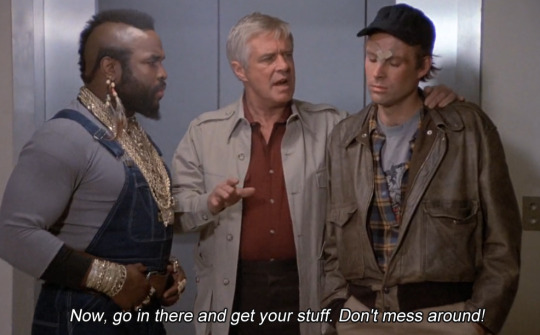
No longer being an inpatient would finally allow Murdock to be employed as a pilot again (his #1 passion), and yet he seems really disheartened about the situation. Even though the hospital gives him no privacy, the staff barely respects him and he spends most of his time there by himself, he still prefers to stay.
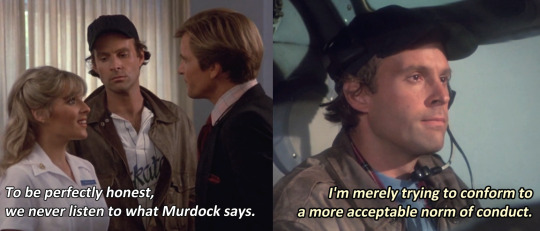
For a character who’s allegedly cheery comic relief, he sure gets his feelings hurt alot, mainly when dealing with other people’s ableism towards him. B.A. and Face are obviously just palling around, just guys bein’ dudes, they don’t want to hurt Murdock for real, they probably don’t realize how sensitive Murdock is about the subject. Usually he plays along or shrugs it off, but sometimes he gets genuinely upset. In the first half of In Plane Sight he’s so fed up with it he tries to ‘‘act normal’‘ until #Woke #Queen Hannibal reassures him that they love him the way he is.
PTSD was barely starting to become a diagnosis when the show first aired, but I think it’s fair to say he suffers from it. The pilot episode states that he has anxiety, paranoia and memory loss, so that checks out.
With PTSD you don’t just have to deal with flashbacks and nightmares, but also intrusive thoughts, images and memories about your trauma. Murdock copes with it by getting hyperfixated on a new activity or pretending he’s someone else. This is were alot of people will go ‘‘haha wow look how wacky and insane he is! He’s talking to his sock 😂’‘. But Murdock knows it’s all made up nonsense, he just needs his mind to focus on something else. What’s important here is that he never lets his coping mechanisms distract him when he’s flying, first of all he’s already focused and also he doesn’t wanna crash (lol). There’s a believability to his actions that’s missing in the 2010 reboot.
In the episode where the gang helps out the vietnamese cook from the POW camp where they’ve been tortured, Murdock tries to distract himself with some golfballs. He soon starts projecting his trauma on them however.
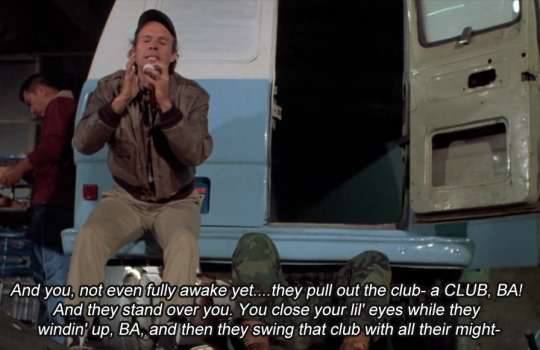
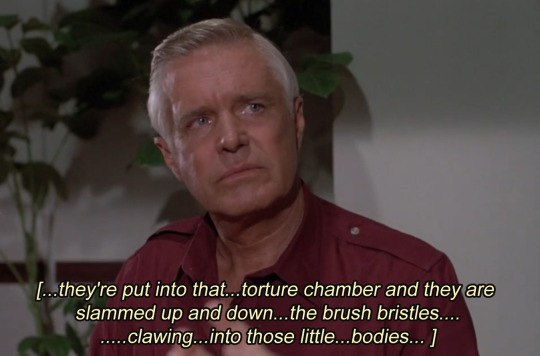
I think this is the only time in the show where Hannibal tears up, so this scene is kinda significant. As the leader, he probably blames himself for getting his team captured and tortured, and seeing that Murdock is still so strongly affected by it gotta hurt.
Compared to the rest of the gang, Murdock’s alot more fucked up over the war. There are subtle changes in his voice whenever he talks about it. In the ep about their old war buddy Ray, Face was reminiscing about how cool of a guy Ray was for borrowing him his helmet, Murdock’s memories meanwhile are much less upbeat. ‘My bird was the only one left in the sky’ he remembers while we see an image of a field filled with shot down helicopters. His experiences are bound to be different from the other three as a huey medevac pilot. Murdock did have one off-screen breakdown in the present timeline, after collecting every newspaper article about the upcoming execution of the team in Firing Line. Apparently it was bad enough that he had to be restrained. It’s been 10 years, so he’s recovering and getting better, but he’s still not all there yet.
Everyone knows Murdock’s just messing around when he’s being interrogated by the military about his connections to the team, but like what about when the military isn’t there; or NO ONE is. He often talks to himself or just puts weird shit in his mouth for no reason while nobody’s paying attention to him (eating leaves, paint, an entire raw egg, a frozen sandwich). Sometimes he’s just unhinged like that.
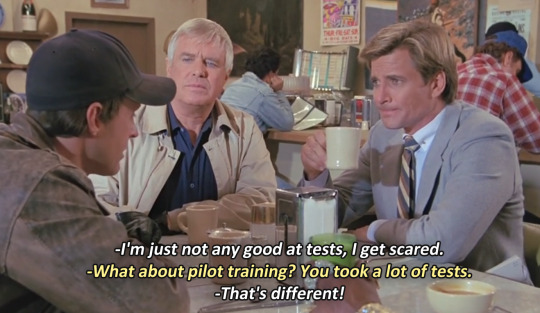
Another thing that’s brought up a few times in the show is his anxiety. Murdock’s often seen being generally tense, sweaty, uncomfortable or reflective in the background of a scene. (I have no idea if this was a deliberate acting choice but Dwight does have anxiety irl so who knows if that had anything to do with it, I mean who knowsssssss, i’m just observing)
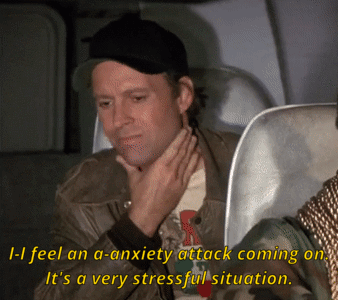
He’s got a habit of fidgeting with his hands or touching his neck when he’s stressed out. Murdock also does it when he’s telling his psychiatrist Dr. Richter about his dreams “If you were me, wouldn’t you be terrified to put your head down?” he asks him.
Richter isn’t really paying attention though, because he’s so used to Murdock’s non-stop clownery, he can’t exactly tell when his patient decides to be honest about his feelings for once. He just replies ‘Well only if it was a bad dream’. Which really irritates Murdock because what other dreams besides bad would he have? So he derails the session by rambling some made up bullshit on purpose.
Richter knows that Murdock uses humor and fantasy to cope, but he’s obviously tired of Murdock’s cringe antics, he just wants to help him. But Murdock doesn’t like to open up and be confronted with his traumas again, he just wants to avoid talking about it all together. There are still parts of reality that Murdock’s not ready to deal with, or he wouldn’t always retreat into his fantasies.
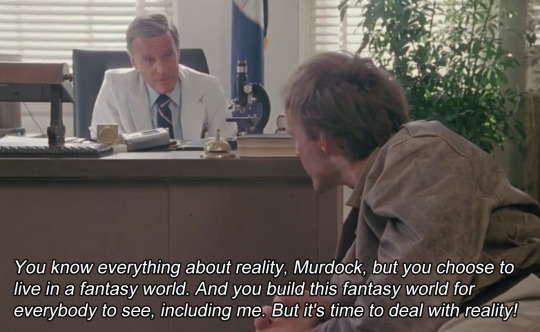
Before he can continue messing around a helicopter passes by and Murdock freezes for a second. Richter assures him that the helicopter is real; Murdock nods and starts fidgeting with his hands again, seemingly in deep thought. We know from the season 4 finale that he hears the sound of rotor blades when he dissociates. He was definitely being sincere here.
After getting drugged by some military goons he has a few brief flashbacks (feat. cheesy 80′s neon filters): seeing the chopper fly away, getting stuck in a potted plant as if he was walking through the jungle, being surrounded by heavy smoke and sparks from the burning carpet).
Despite being the 2nd highest ranked team member, Murdock dislikes being in charge and gets severly distressed when anything goes wrong that he might even be slightly responsible for. Most notably is the episode where the owners of the diner get kidnapped after Murdock got knocked out by evil cowboys or hill billies or whatever they were. Instead of telling anyone what happened, he’s just lying on the floor, repeatedly calling himself a failure until the others show up.
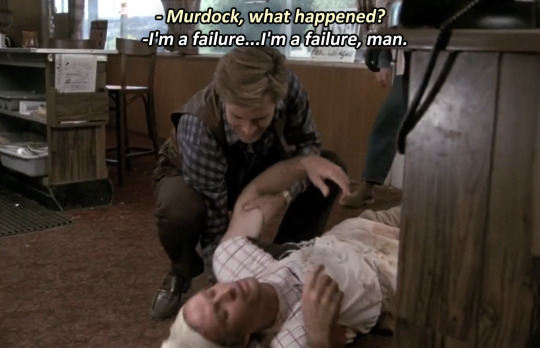
Seems like Murdock gets startled more easily than the rest of the crew as well. We often see him flinch when guns go off; one time he literally wore fluffy ear muffs to a backalley shootout.
This short moment from Family Reunion always stood out to me. Face opens the van door a little too quickly and it takes Murdock so off-guard he has to take deep breaths to calm down.

Murdock sounds exhausted when he has to remind Face not to sneak up on him. Face also realizes he messed up, he just wanted to check up on Murdock and not trigger him on accident.
When it comes to portrayals of mental illness in fiction there’s obviously better representation out there than Murdock. But sometimes you just wanna see a mentally ill character have a good time instead of being miserable 24/7. And Murdock’s already got the worst behind him, he’s had therapy for years and friends who love him. I just think that’s refreshing to see, especially with a character who’s so kind and openly affectionate.
#the a team#hm murdock#howling mad murdock#mental illness#dwight schultz#meta#out here being corny at 2am#ptsd
273 notes
·
View notes
Text
What are the inattentive symptoms of ADHD?
Before I answer, it’s important to acknowledge that not everyone experiences ADHD the same way. I came up with this list through hours of extensive research, but I still explained each one based on how I experience them personally, because I wanted it to be an honest and accurate resource.
Now, I experience every inattentive symptom of ADHD severely. As well as most hyperactive type symptoms, but not nearly as severely. Hence why my explanations are on the severe side. So if you don’t experience every one of these, or you don’t experience them exactly like this, that doesn’t mean you don’t have ADHD.
Most Commonly Known Symptoms:
Inattentive ADHD is pretty much the same thing as hyperactive ADHD but with less hyperactive tendencies. So technically these symptoms apply to both, but ADHD has a few more that won’t be listed here.
• Inability to focus on disinteresting or unengaging tasks even if you need or even want to – As if your brain physically won’t let you. Because that’s exactly what’s happening. There is no, “Just do it because you have to.”
For real. Imagine a video came where you’ve reached the end of the map and there’s that invisible barrier to keep you from going any farther. But all the other players are passing it just fine. They look at you like you’re crazy and can’t believe that you can’t get through. But it’s literally IMPOSSIBLE.
Now apply that to easy individual movements or tasks like plugging in your charger right next to you or washing a few bowls.
• Focusing WAY too much on this single thing whether you like it or not. It’s called “hyperfixating” and it’s both the most exhilarating experience in the world and the most soul crushing. You can watch/do nothing else, consume nothing else, think of nothing else. It’s exciting and invigorating. But as soon as there is no more material/info about it to devour, existence is gray and meaningless. The adrenaline rush and laser focus are like nothing else, but the crash is just as intense.
• Inability to divert attention to something different when you're already focused on something else. (More of a product of the two above, really)
• Inability to organize or maintain a neat system. It’s not that we don’t have a system (because we do, and if it’s altered in the most miniscule way we will know and we will be furious) but that our systems tend to be more about ease of access. It looks messy, but everything is just easily reachable instead of tucked away in drawers or hidden in organizer bins.
“Out of sight, out of mind.” As soon as we can’t see it, or we get used to it and it becomes a background visual (like background noise but for your eyes), it no longer exists. Until we see it again we have never seen it before either.
• Emotions are forceful and kinda scary. Lacking the ability to regulate emotions means violently strong feelings. They can sweep you away and leave you stranded in an uncomfortable predicament. Major highs and lows as well as strong grudges and emotionally based actions.
• Distractability: There’s this stereotype that all people with ADHD are hyper airheads who cut off mid sentence to shout random shit like “SQUIRREL!” whenever they see something remotely interesting. They’re super excited about it and HAVE to let everyone know, no matter what they were doing before. It’s kind of the “cutesie” version that the media portrays a lot. Most ADHDers don’t actually fit this stereotype.
However, stereotypes are often based on true characteristics, even if they have been twisted into a sick joke or a cruel portrayal.
NOTE: There is nothing wrong with this form of ADHD. It just sucks that if you don’t match this stereotype, no one really believes you have ADHD. Also that so many people use it to insult and bully people with ADHD, even if that isn’t how they display their symptoms.
Lesser Known Symptoms:
Basically if these are #relateable, you probably have ADHD.
• Unable to conceptualize time in any way. Will this take two minutes? Three hours? No one knows! You thought this would take a half hour at most and it’s taken three! How?? This was a five-minute task and you’ve just realized you zoned out. It felt like two seconds but it was two hours!
• There is only Now and Not Now. Again, it’s a time thing. The future always seems so far away that it's almost like it doesn't exist. "Time is a construct" is something I often say because I have no sense of time passing, having past, or will pass. People describe me as "living in the present.” But that’s only because I forget that there is a future or that time is moving. I just don't think about it at all and when I try to it's impossible to understand and it feels made up.
• Sensitive to any form of rejection, actual or perceived. A friend texts you back, but they don’t sound nearly as enthusiastic as usual. You immediately tear your message apart to try to find what upset them and how you can make it up to them. Because surely that’s what that nontypical period means? You want to curl up in a hole and never come out, never face the horrible thing you’ve done to a treasured friend. Intense fear and sorrow mingle into all consuming guilt. The kind that makes you wish you’d never met them, just so they wouldn’t have to be hurt by you now. All because they added a period.
Everyone with some form of an anxiety disorder will recognize this. But it’s also a very common ADHD experience. This is in part because anxiety is SUPER likely to be comorbid with ADHD. But we also have Rejection Sensative Dysphoria. Which basically means we’re ridiculously sensitive to the slightest possibility of the barest chance that we maybe might receive a sliver of perceived ambiguous rejection. To the point where we cut off good relationships for seemingly no reason because we’re too afraid to even speak to them again, much less explain our emotions that we know are irrational but can’t help. The guilt and regret are too agonizing, the fear to face them too much.
• Reading is AWFUL. We’ve already established that attention is not your friend. Unfortunately, that makes it difficult to read blocks of boring text. The information could be good, it could be fun even. But if the format is too uniform and plain, it’s impossible to get past the first few sentences. You just keep rereading the same line over and over, realizing every time that you zoned out halfway across. It’s infuriating and very sad. It also makes studying an absolute nightmare.
Many people actually don’t have this experience. They hyperfocus on their reading or their schoolwork so it isn’t a problem. I was the same way until college and now I can’t even read a little recipe card without zoning out. But it’s a very common experience nevertheless so I listed it anyway.
• Ringing ears, hearing electricity. This is one I just heard about. I haven’t been able to actually research this one, but it’s interesting and every ADHDer I know has confirmed it so I’m adding it. ‘Cause I’ve had constant ringing since I was old enough to talk. And I’ve always been able to hear power lines, household appliances, wires inside the walls, all those varying vibrating hums and crackling pops. It’s one of the weird quirks that “run in the family.” Just like Tinnitus and all ADHD symptoms. Apparently, MANY people with ADHD have similar experiences.
• Negative stimming. Things that negatively stimulate your senses. After encountering a certain stim, you feel it physically. It causes a sensation that hurts, in a way. It shouldn’t, logically. But your body’s reaction is to pain. This includes foods you can’t eat because the texture is wrong. Clothing you can’t wear because you can easily breath but no you really can’t because the collar sits wrong against your throat. Sounds that make your spine stiffen or skin crawl. Bright lights or colors that don’t affect anyone else but make your head ache.
Stims and sensitivity can affect any and all senses. A certain smell, agitating fabrics, an unbelievably smooth stone, specific tastes and food textures, certain color combinations, particular sounds/pitches/volumes, et cetera.
• Positive stimming. The other side of the sensory coin. Things that are exceptionally pleasant to your senses/stimulate you positively. For example, the way light shines through a transparent bright blue gem. Watching the light catch and twist so fluidly when you move it takes your breath away. There’s a euphoric feeling to it, and you can’t look away. It’s too pleasing. It’s like a deep satisfaction you can physically feel throughout your whole body, emanating from deep within your chest. You never want to stop that feeling.
Personally, it feels like my chest is somehow much deeper than it actually is. And at the farthest, deepest part is where that satisfaction settles. Nothing else can ever reach that hidden, impossibly deep cavity. It’s so amazing, I never want it to stop. It can feel like that endless pit is starved, and the stim is the first sustenance it’s ever had so it never what’s to let it go.
• Forgetting supposedly unforgettable things. Like where the fuck I parked my car. Also what my car looks like. It’s blue right? It has a hatch. I accidently memorized the license plate (complicated story) but I can’t tell you what model it is?? Is it even in this parking lot? I’ve never parked anywhere else but my memory is obviously garbage so now I need to check every parking lot just in case.
End Note:
It’s important to know that ADHD has many symptoms that overlap with other nuerodivergencies such as autism or ASD. Executive dysfunction can be caused by a number of mental illnesses such as depression and anxiety. Emotional regulation problems can look just like Bipolar disorder and vice versus.
My point is, every symptom could actually be something else. It’s really easy to be misdiagnosed because they all have such similar symptoms. I know someone who thought they had ADHD for years, but it was actually a mix of severe depression and anxiety that fucked with their working memory (as both depression and anxiety do). Someone else I know was diagnosed with manic depression and thought they might be bipolar, but it was undiagnosed ADD the whole time.
#cassidy talks once in a while#info about everything adhd#add#add symptoms#adhd symptoms#add info#adhd info#add information#adhd information
188 notes
·
View notes